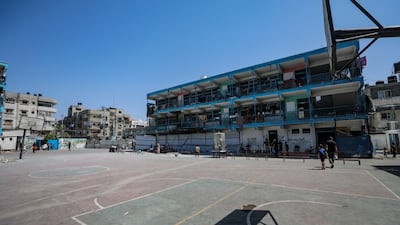Al Jaouni school was built by the UN to educate a few hundred teenage boys in the central Gaza Strip. In recent months, the blue, three-storey building has come to house 12,000 Gazans seeking shelter from the relentless barrage of Israeli air strikes that have levelled most of the strip since last October. On Wednesday, the school itself was made a target – for the fifth time since the war began – when Israel’s military said it carried out a “precise strike on terrorists” planning attacks from its grounds.
Even if the strike were intended to be “precise” – an odd descriptor for firing a missile at a compound housing 12,000 people – it manifestly was not. Of the 18 people killed, six were Palestinian employees of the UNRWA, the UN agency for Palestinian refugees.
The attack is a particularly disturbing moment for the agency’s humanitarian operations in the Palestinian enclave. It resulted in the highest death toll among UNRWA staff in a single incident since the Gaza war began. It also brings the total number of UNRWA personnel killed to 220. Many of them were killed in attacks on schools; Israel has bombed 70 per cent of all UNRWA schools in Gaza since October. The agency says about one in 75 Gazans killed were sheltering in one of its facilities at the time of their death.
Even if militants were using some part of Al Jaouni school to plan an attack, targeting the compound would almost certainly breach international humanitarian law, which allows for civilian and humanitarian facilities to be attacked in only the most extreme circumstances. The frequency with which the Israeli army attacks UNRWA schools, in particular, suggests a cavalier approach to distinguishing between military and civilian targets.
“These dramatic violations of international humanitarian law need to stop now,” Antonio Guterres, the UN Secretary General, wrote on social media on Thursday.
The attack occurred on the penultimate day of a polio vaccination drive, in which UN personnel and other aid workers have sought to inoculate more than half a million Gazan children in under a fortnight. The operating environment for these workers is extremely difficult even without the threat of air strikes. On Monday, Israeli soldiers halted a UN convoy involved in the vaccination drive and detained two staff members for questioning, despite the convoy’s movements having been cleared with the Israeli military in advance.
The UN’s humanitarian co-ordinator, Muhannad Hadi, said shots were fired during the incident, UN vehicles were damaged by bulldozers and “the convoy remained held at gunpoint while senior-level UN officials engaged with the Israeli authorities to de-escalate the situation”. The convoy eventually turned back without being able to carry out its mission.
The longer Israel’s war in Gaza drags on, the worse the humanitarian crisis Gazans are experiencing becomes. The stress on the strip’s already-limited humanitarian infrastructure is deepening as a result. Every month, the number of available facilities – not just shelters, but hospitals and distribution points – is shrinking, and the number of dead aid workers is growing. The situation must not be allowed to continue. So much has already been taken away from Gazans – without a functioning aid sector, what else do they have left?


